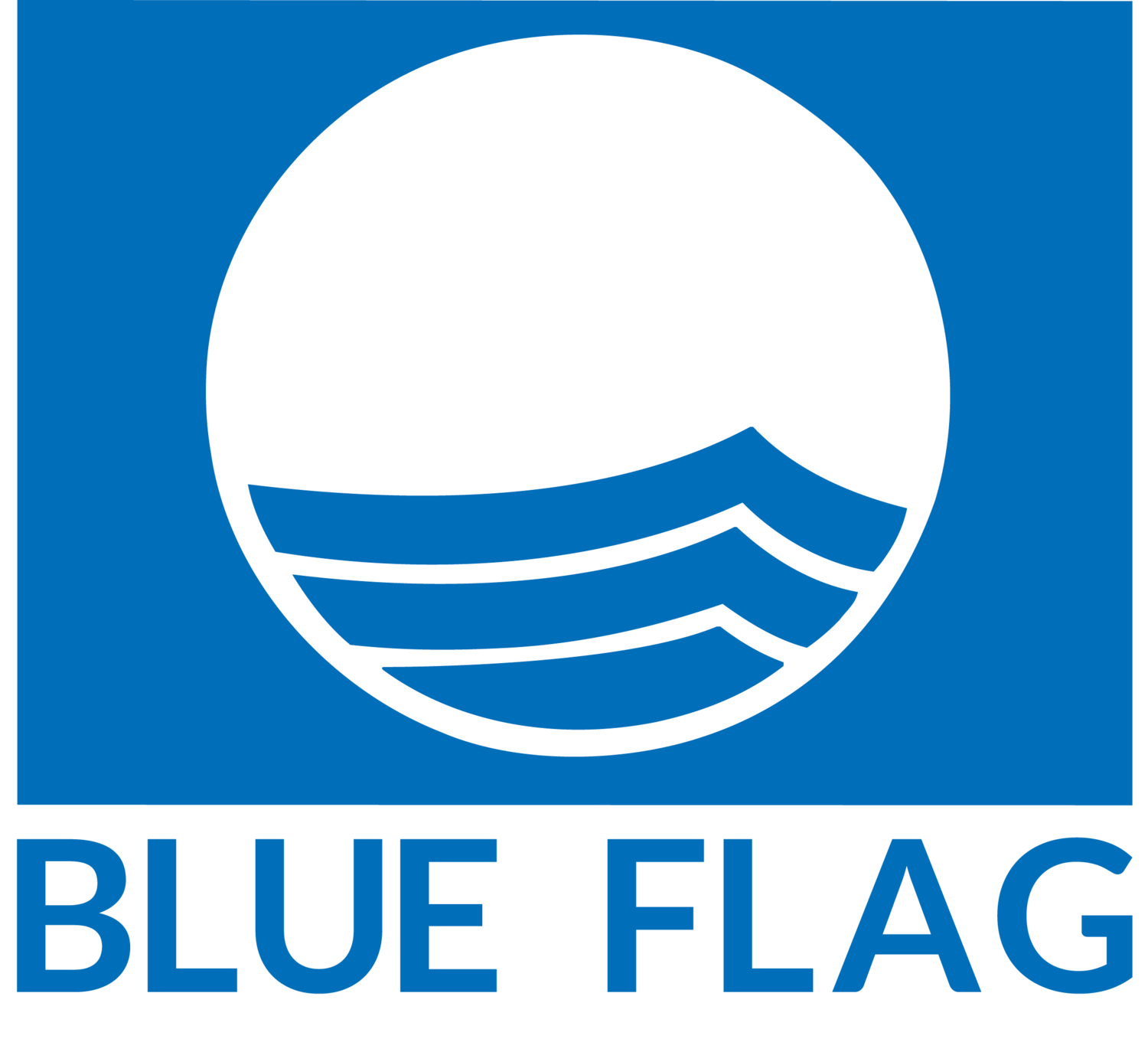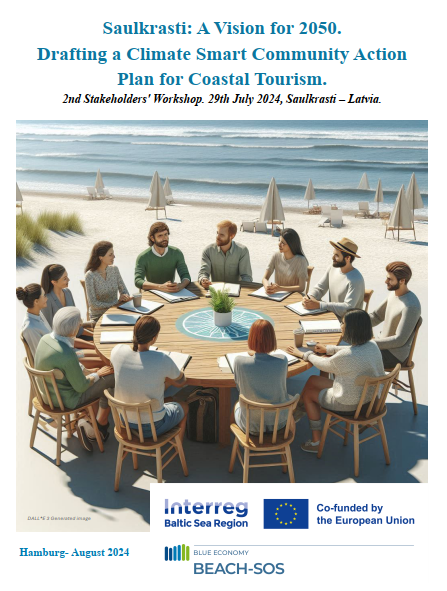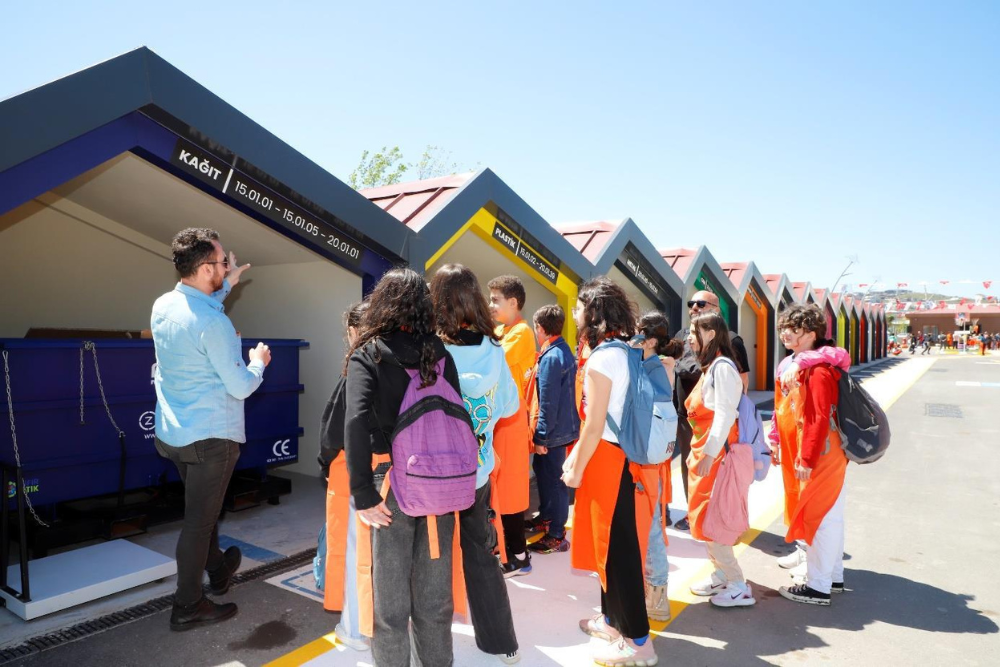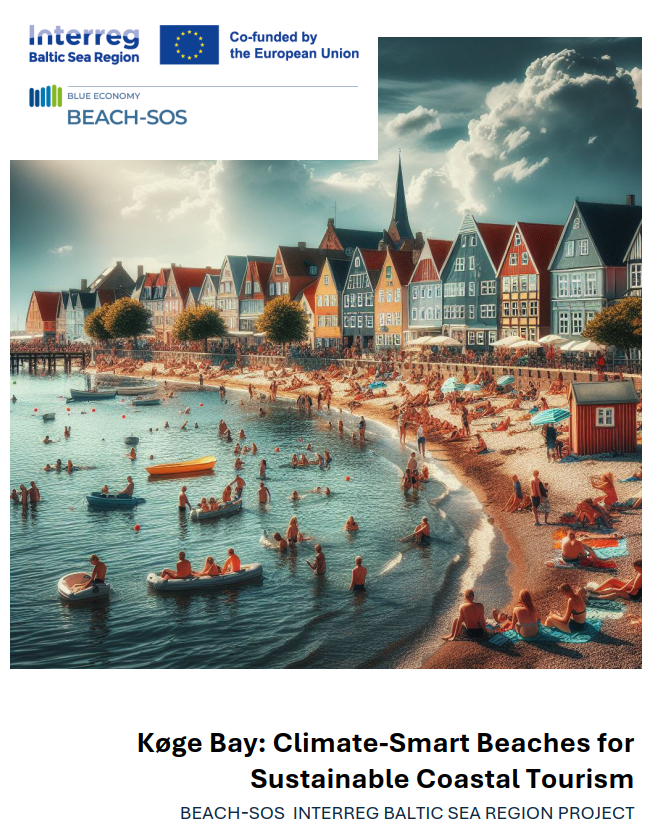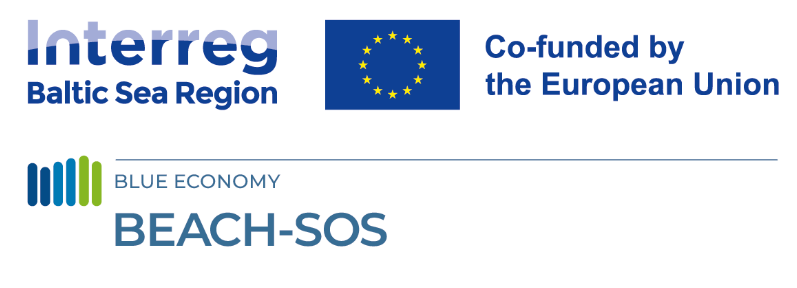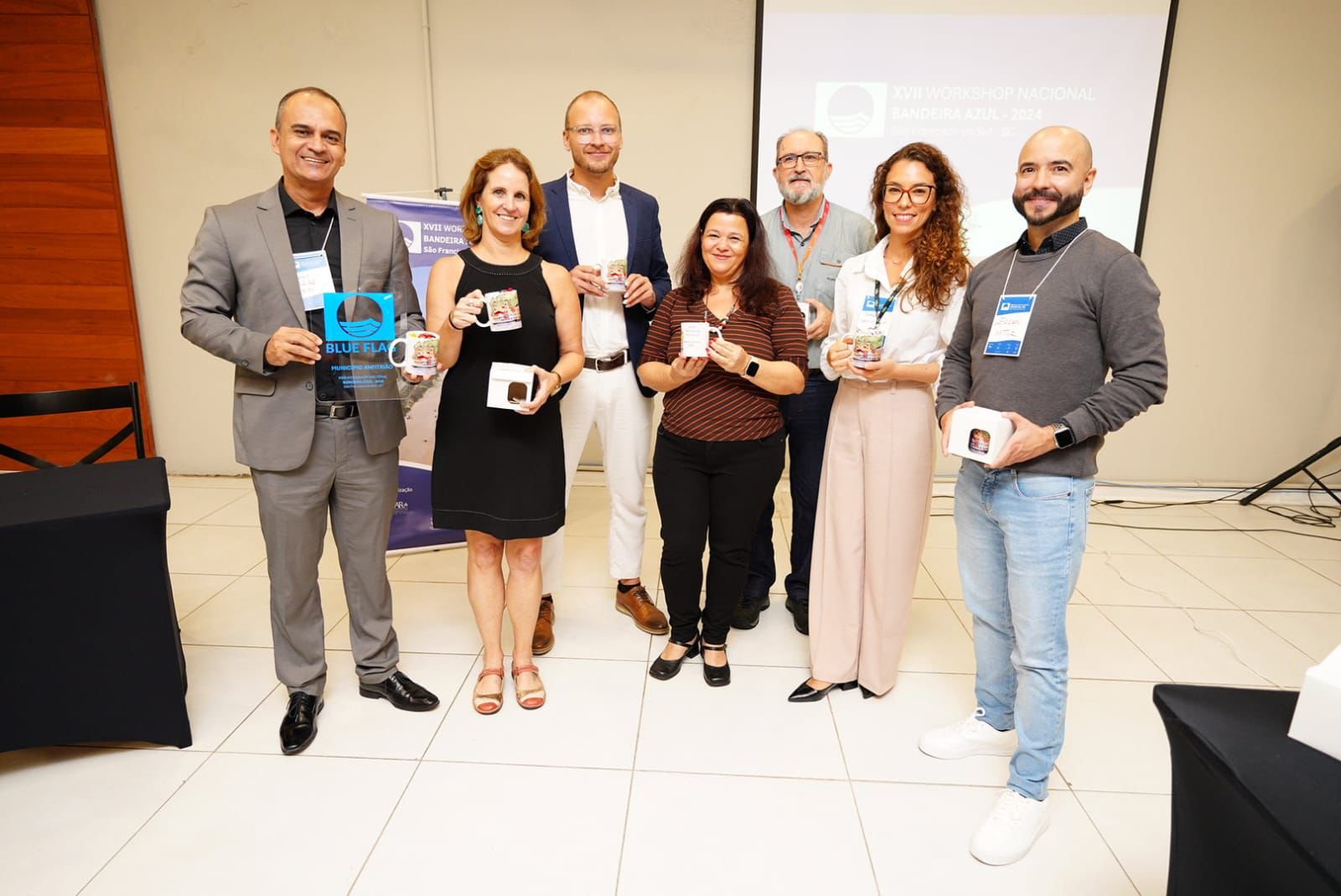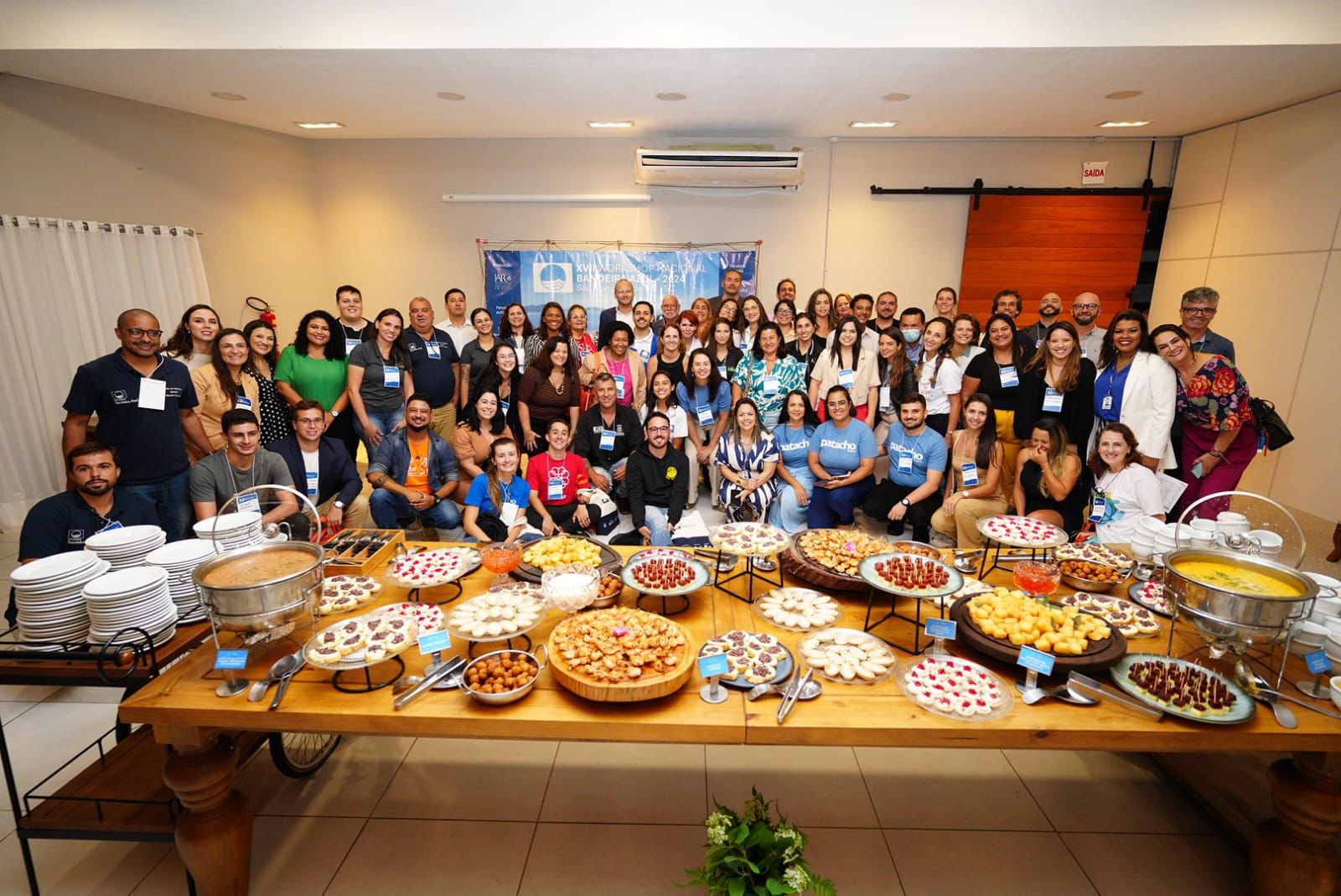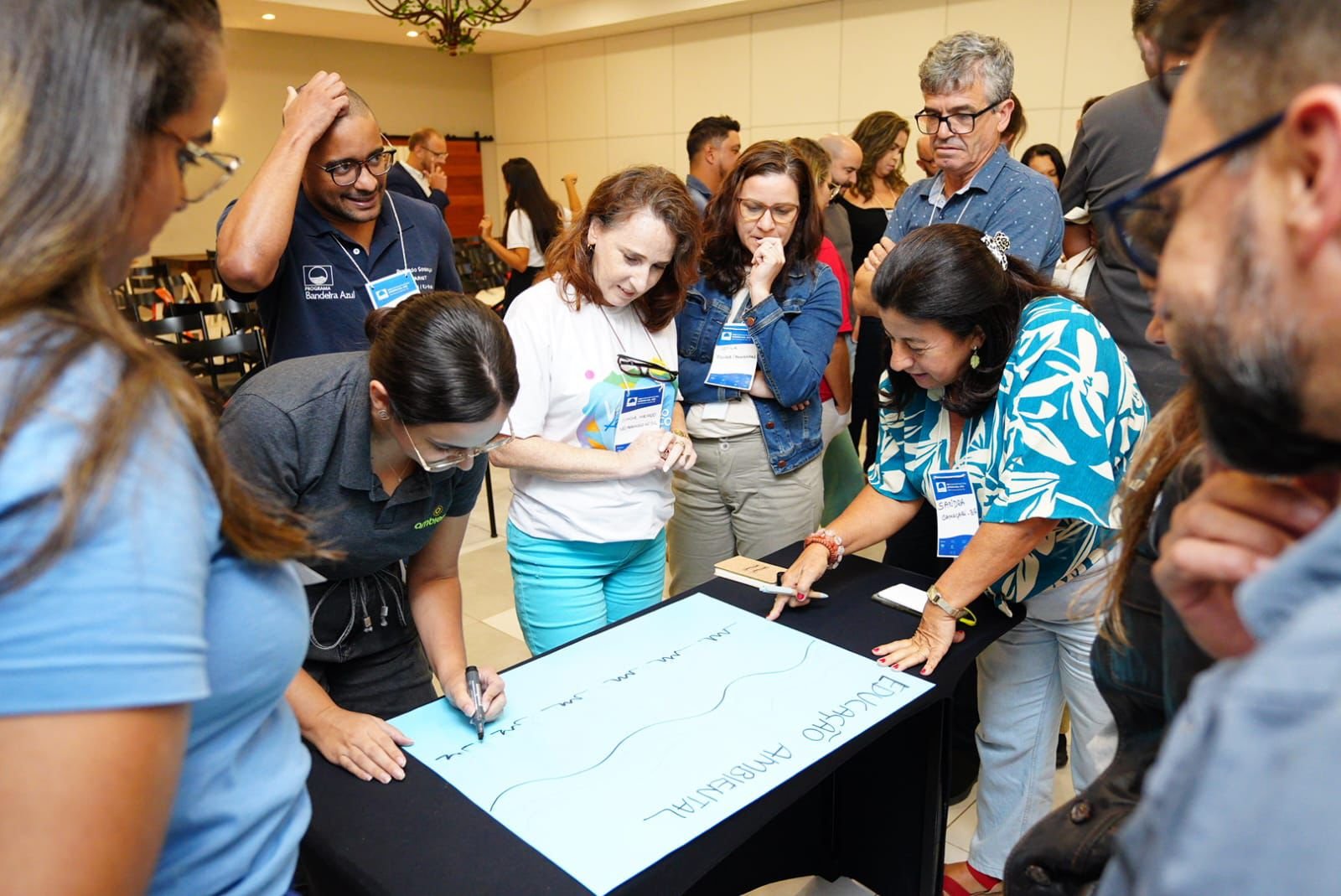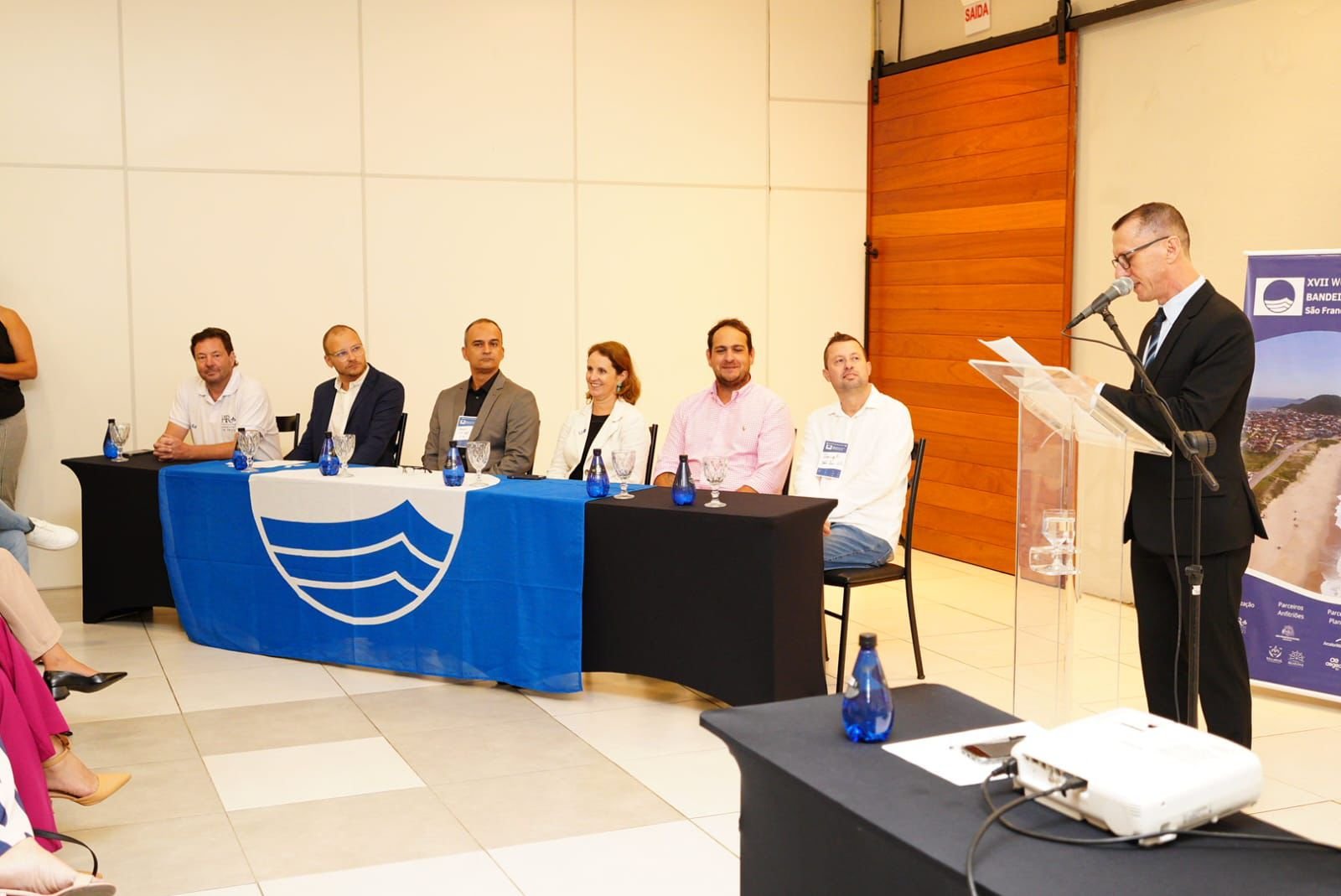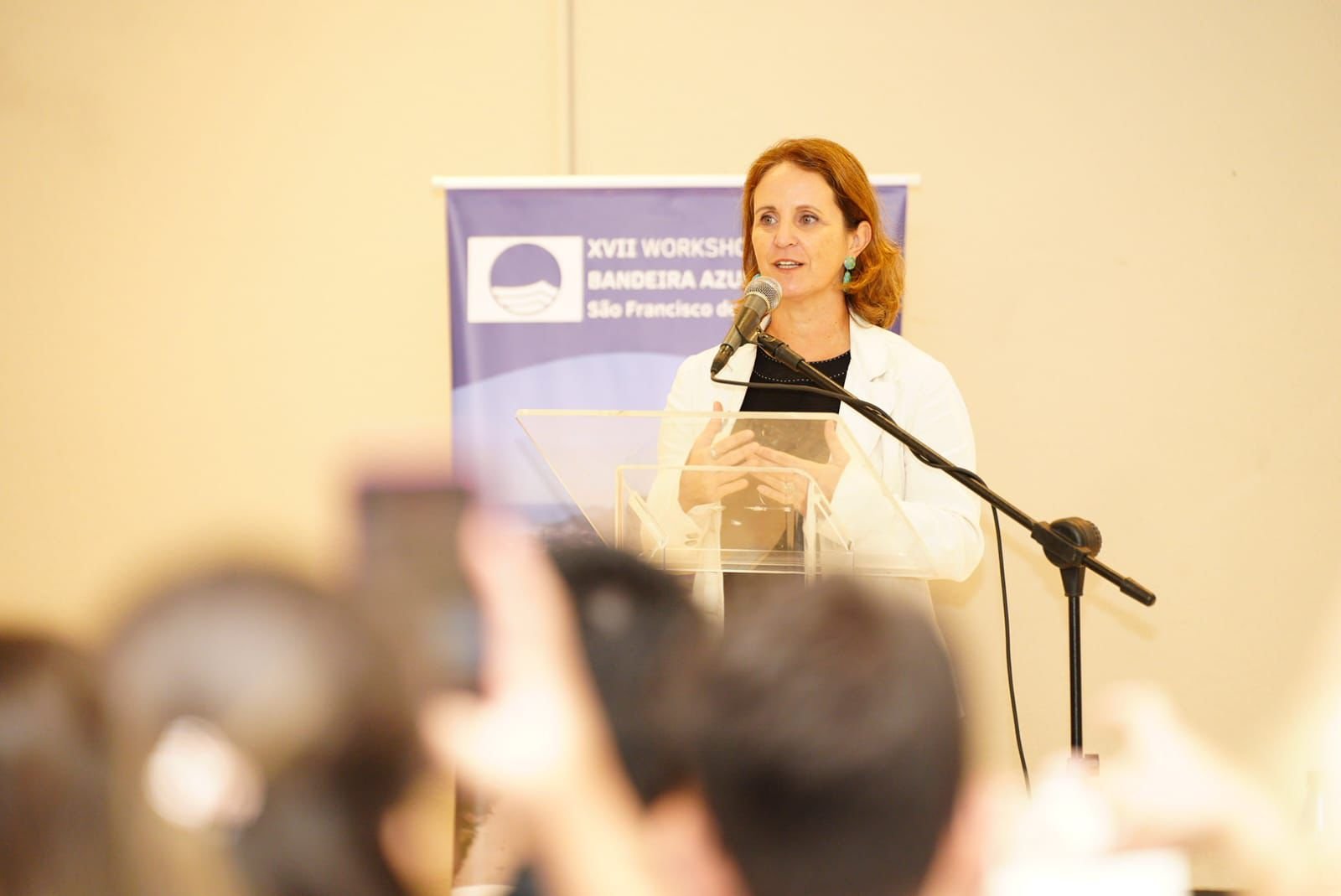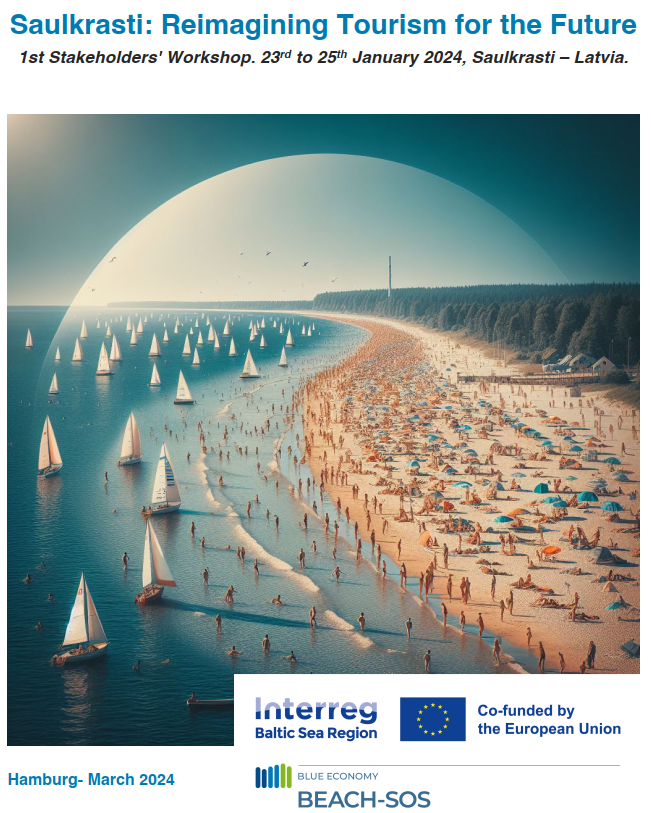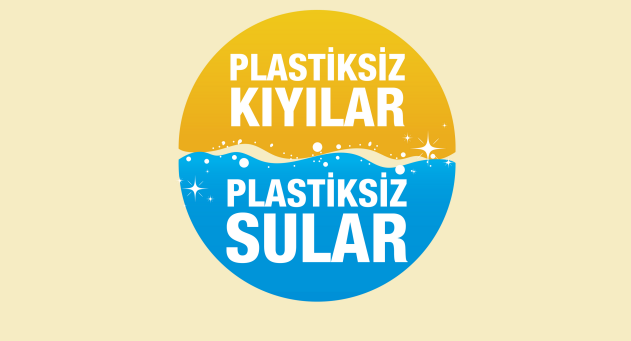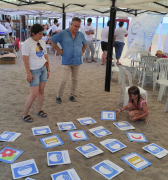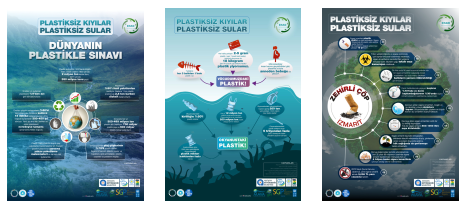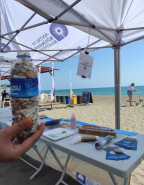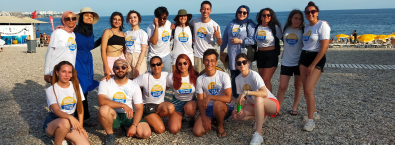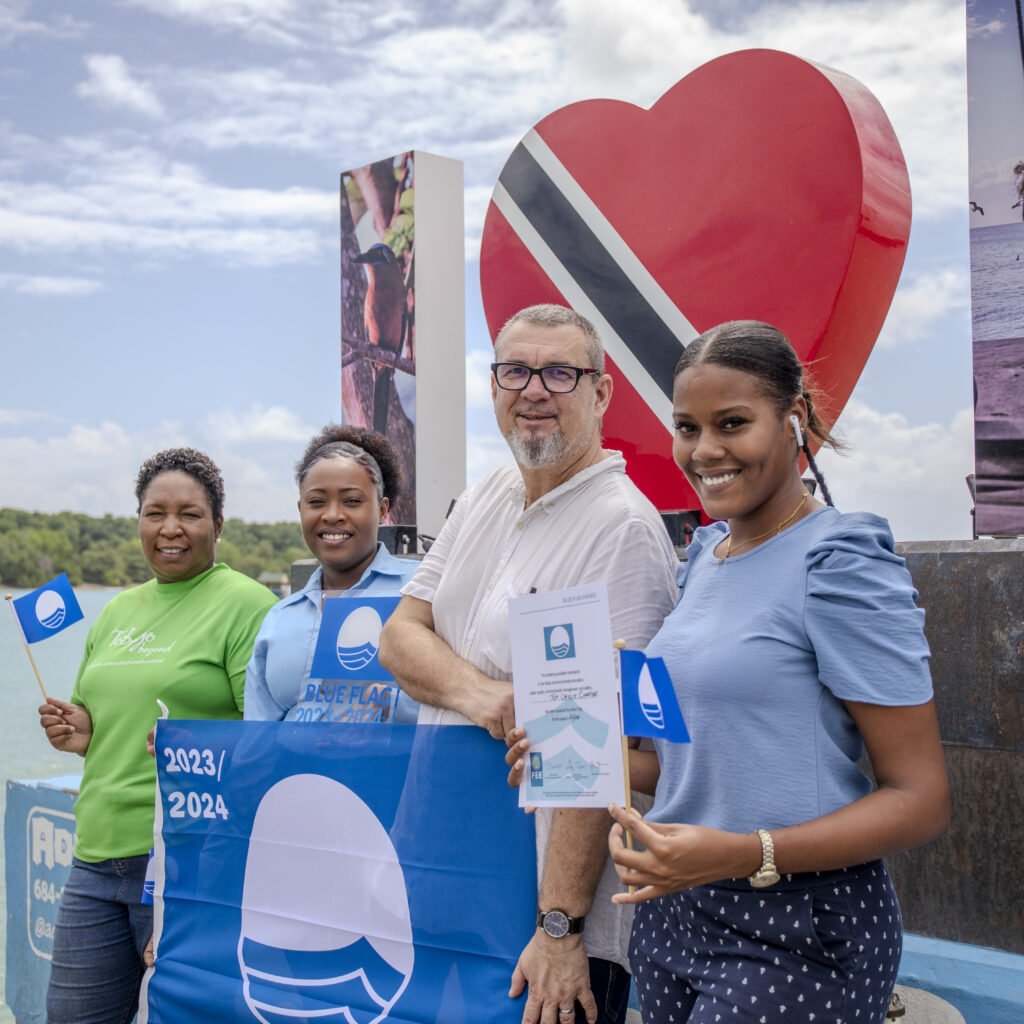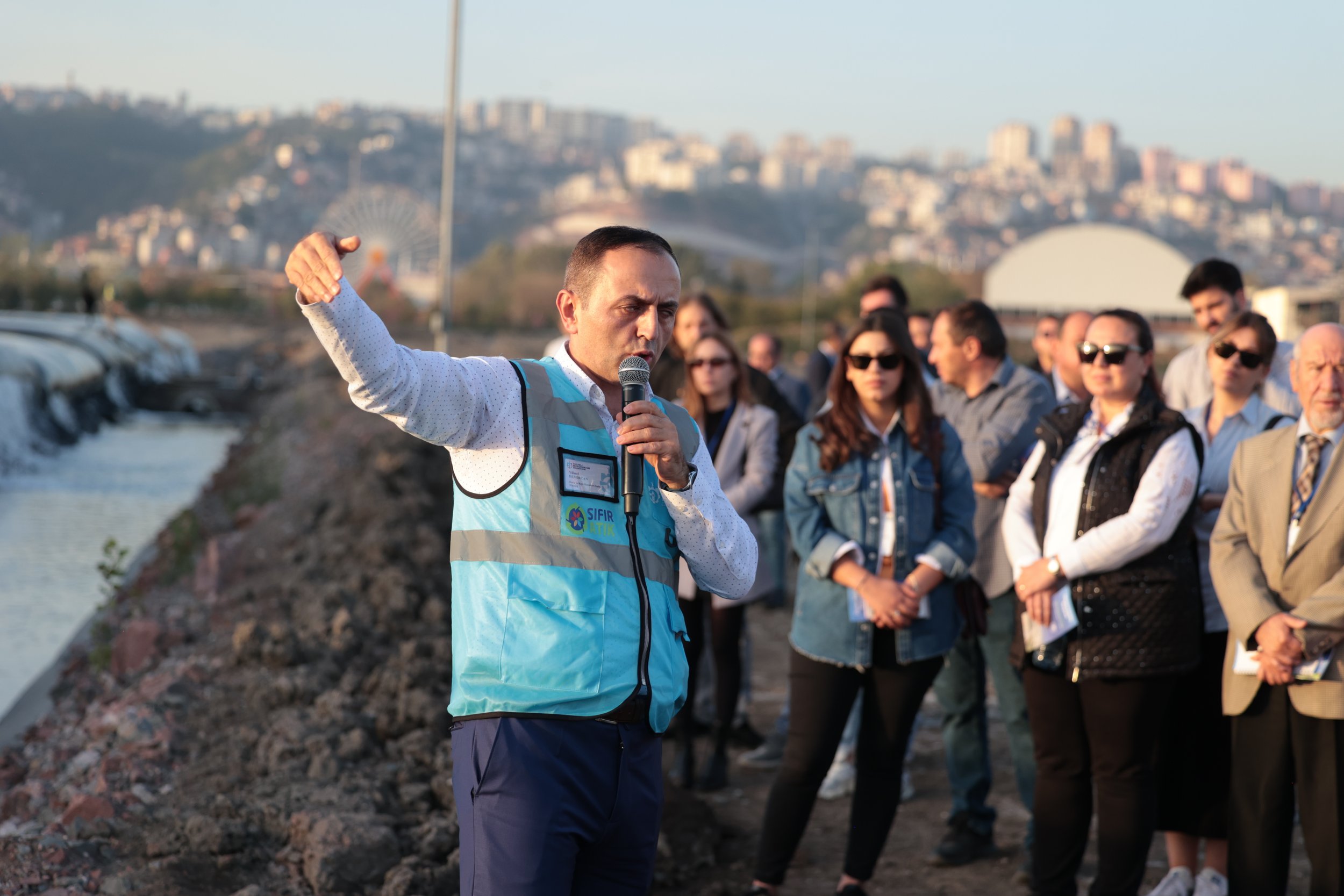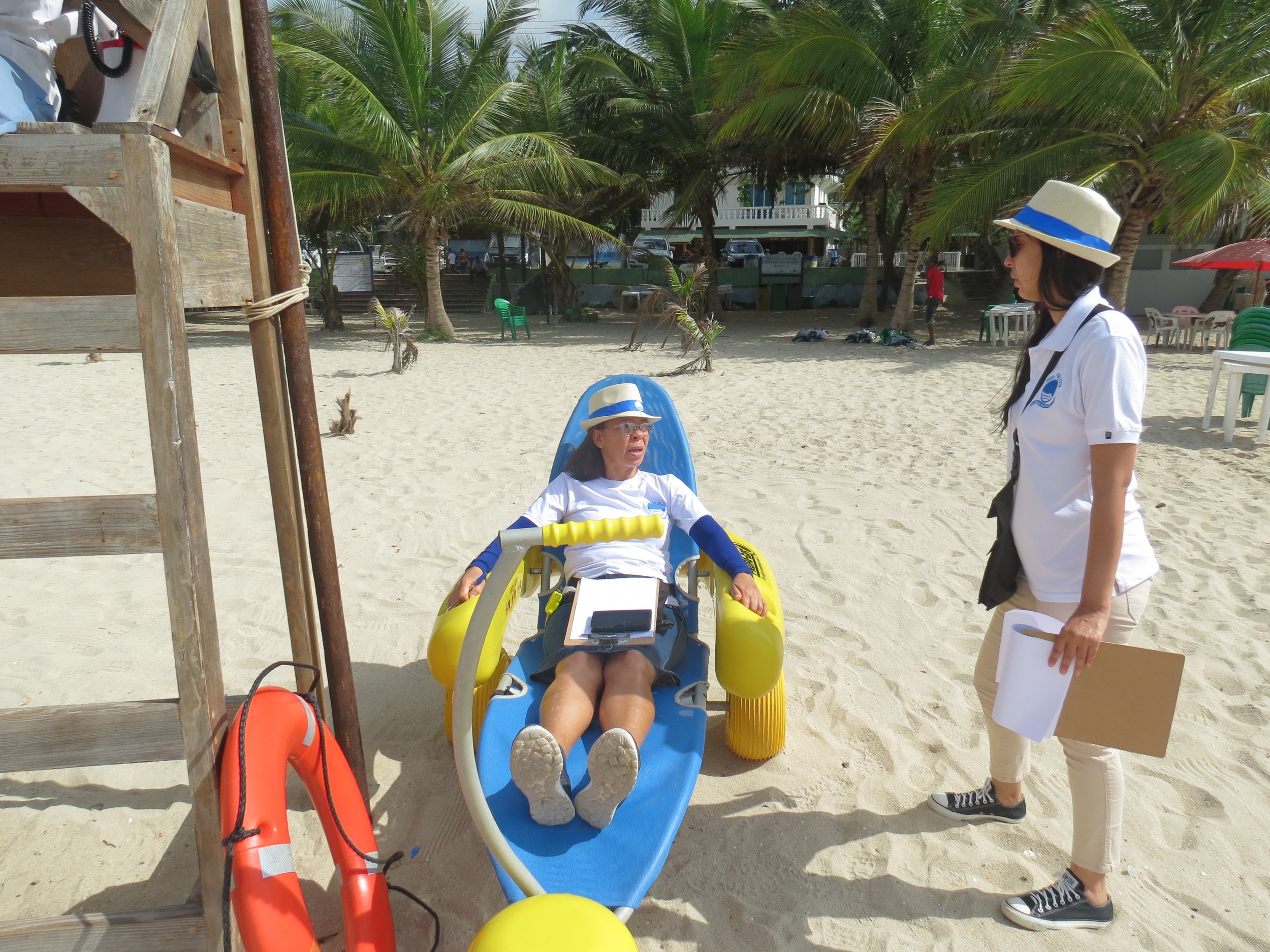Photo Caption: Ms. Lesley Jones, President of the Foundation for Environmental Education, leads discussions alongside (seated from left) Mr. Johann Durand, Director of Blue Flag International; Mr. Alessandro Ventil, Blue Flag International Coordinator; and Mr. Joaquín Díaz, FEE Director for Blue Flag.
Scarborough, Tobago – October 20, 2024: Green T&T, together with the Tobago Tourism Agency Limited (TTAL) and the Foundation for Environmental Education (FEE), successfully hosted the 2024 Blue Flag National Operators Meeting (NOM) in Tobago from October 15–18, bringing together over 50 international delegates from 30 countries to discuss sustainable tourism and environmental policies. This annual meeting of National Operators, held at the Shaw Park Cultural Complex, showcased Tobago’s commitment to eco-conscious travel and underscored the island’s growing reputation as a leader in sustainable tourism.
The Blue Flag programme, one of the world’s most recognized environmental certifications, sets stringent standards for beaches, marinas, and sustainable boat tour operators. Administered locally by Green T&T with support from TTAL, this year’s NOM focused on aligning efforts with FEE’s GAIA 20:30 strategy, which addresses critical global challenges like climate change, biodiversity loss, and pollution.
The NOM opened with a welcome ceremony hosted by the Chief Secretary of the Tobago House of Assembly (THA), Honourable Farley Augustine, who welcomed delegates to the island, with a vibrant display of Tobago’s hospitality, local cuisine and culture. In addressing the delegates, the Chief Secretary stressed the importance of the event for the island.
In addition to discussions regarding the future of the Blue Flag programme, this year’s National Operators Meeting in Tobago will also drive the development of a sustainability boat tour operator policy for the blue economy, which will be led by Green T&T and the Blue Flag International Office, with funding from UNDP Global Environment Facility (GEF) Small Grants Programme. With these efforts, the legacy of the 2024 Blue Flag National Operators Meeting in Tobago will be long-lasting, strengthening the island’s reputation as a destination for eco-friendly tourism while fostering long-term connections for future international events and initiatives.
From left: Mr. Julien Skeete, the Administrator in the Division of Tourism, Culture, Antiquities, and Transportation; His Excellency Peter Cavendish, Ambassador of the EU Delegation to Trinidad and Tobago; Ms. Lesley Jones, President of the Foundation for Environmental Education; the Honourable Farley Chavez Augustine, Chief Secretary, Tobago House of Assembly; Councillor Tashia Grace Burris, Secretary of Tourism, Culture, Antiquities and Transportation · The Tobago House of Assembly; Assemblyman Niall George, Assistant Secretary for Tourism, Culture, Antiquities and Transportation and Ms. Joanna Moses-Wothke, Blue Flag National Coordinator for Trinidad and Tobago and CEO of Green T&T, at the Welcome Dinner for the 2024 Blue Flag National Operators Meeting, hosted under the auspices of the Honourable Farley Chavez Augustine, Chief Secretary of the THA at the Shaw Park Cultural Complex on Tuesday 15th October, 2024.
Also speaking at the welcome ceremony for the meeting, His Excellency Peter Cavendish, Ambassador of the EU Delegation to Trinidad and Tobago noted the commonality in objectives between Trinidad and Tobago and the European Union in driving sustainable tourism, and welcomed the opportunity to further discussions for a common strategy.
His Excellency Peter Cavendish, Ambassador of the EU Delegation to Trinidad and Tobago during his address at the Welcome Dinner for the 2024 Blue Flag National Operators Meeting, hosted under the auspices of the Honourable Farley Chavez Augustine, Chief Secretary of the THA at the Shaw Park Cultural Complex on Tuesday 15th October, 2024.
Describing Trinidad and Tobago as a cornucopia of talent and genius, His Excellency also praised the selection of Tobago as the host for this year’s event, stating that “whoever chose Tobago for this meeting, it was a sort of an act of genius.” He added:
“You're standing in a country which has produced the only new percussion instrument in the last 50 years, where one third of the world's trade passes outside of the windows, which has the world's number one chocolate, which has the world's number one cocoa genome, which has the world's number one cocoa research centre, which has invented Soca, Sol and Calypso…More importantly as environmentalists…you're standing in the shadow of the boundary main ridge reserve. The legislation enacted at the time by the British Parliament in 1776 is considered to be the first piece of environmental legislation of the modern era.”
Following the strategic meetings, delegates also had the opportunity to immerse themselves in the island’s rich local culture and natural beauty, experiencing some of the most memorable and authentic local attractions that take our visitors beyond the ordinary, including excursions to the historic Fort King George, the UNESCO-designated Main Ridge Forest Reserve, and the renowned Buccoo Reef with the Blue Flag certified Miss Ayana Glass-bottom Boat Tours.
A group photo at Fort King George of the delegation attending the Blue Flag National Operators Meeting.
Through strategic partnerships and initiatives such as the Blue Flag programme, TTAL remains committed to strengthening the island’s brand of Tobago Beyond Ordinary by raising the island’s profile as a leader in sustainable tourism and eco-conscious travel in the Caribbean. Visit tobagobeyond.com and follow the TTAL on social media to learn more.
Highlights and Outcomes of the 2024 Blue Flag NOM:
● Collaborative Sessions on Sustainability: Three key sessions tackled climate change, biodiversity, and pollution, fostering a collaborative space for policy development and knowledge sharing. Presentations included:
○ Secondary Schools: Presentations from the environmental clubs from Signal Hill Secondary School, Bishop`s High School and Mason Hall Secondary School on their climate change, biodiversity and pollution mitigation initiatives.
○ Climate Action: The Caribbean Climate-Smart Accelerator outlined funding opportunities, while Trinidad and Tobago Meteorological Services highlighted projections on temperature rises and their effects on marine life.
○ Biodiversity Initiatives: Discussions on UNESCO’s Man and the Biosphere designation and turtle conservation by SPESEAS brought focus to ecosystem protection.
○ Pollution Solutions: The Department of the Environment presented solutions for waste management in Small Island Developing States (SIDS).
● Blue Flag SIDS Strategic Meeting: Led by Green T&T, this session achieved a consensus among THA, private sector, and civil society leaders on advancing the Blue Flag programme in Tobago. Preliminary recommendations were developed to align with local policies, support SDGs, and strengthen the blue economy.
● Semaphore Recycled Blue Flag Fashion Show: Held on October 17, this unique event showcased designs crafted from repurposed Blue Flags by students from seven local secondary schools. Themed “Paint de Town Blue,” the fashion show celebrated creativity in sustainable fashion while reinforcing the values of the blue economy and Tobago’s rich cultural heritage.
Back: Secondary School Students adorned in their Blue Flag flags recycled fashion pieces. Front Three distinct judges of the secondary school fashion show competition, with the CEO of Green T&T seated far right.
Ongoing Initiatives and Future Goals: Green T&T is currently compiling recommendations from the NOM to support sustainable blue economy policies, specifically for tour boat operations. In collaboration with TTAL, Green T&T will also release a documentary and media content capturing the event’s highlights and key outcomes, broadening public engagement with Blue Flag objectives and sustainable tourism initiatives.
Green T&T’s Commitment to Sustainable Tourism: Green T&T, as the national operator for the Blue Flag Programme, remains dedicated to raising environmental standards and strengthening the blue economy through collaborative projects. This meeting reinforced the shared goals of Tobago’s stakeholders, positioning the island as a model for eco-friendly travel in the Caribbean.
About Tobago
Nestled in the heart of the Caribbean, Tobago stands as an enchanting gem, captivating visitors with its pristine beauty and vibrant cultural tapestry. Renowned for its year-round cultural festivals, secluded white sand beaches, and breath-taking natural wonders, Tobago invites travellers to go beyond the ordinary in a setting that remains unspoilt, untouched and undiscovered.
About Tobago Tourism Agency Limited (TTAL)
Since its establishment in July 2017, TTAL has been at the forefront of transforming Tobago's tourism industry. Our core mandate is to lead the (re)development of Tobago's tourism product and strategically (re)position it as a premier island destination grounded in sustainable development. This includes setting quality standards, training industry professionals, conducting impactful research, developing high-quality products and services, and facilitating strategic investments in the island’s tourism industry.
Green T&T
Green T&T, the national operator for the Blue Flag Programme in Trinidad and Tobago, plays a pivotal role in promoting sustainability through internationally recognized environmental standards and certification programs. As a full member of FEE, Green T&T has led the implementation of the Blue Flag and Green Key certifications locally. The 2024 NOM will provide a platform to align stakeholder projects with Tobago’s sustainable tourism goals, achieve consensus among public, private, and civil society sectors, and further the implementation of the Blue Flag Programme in the region.
